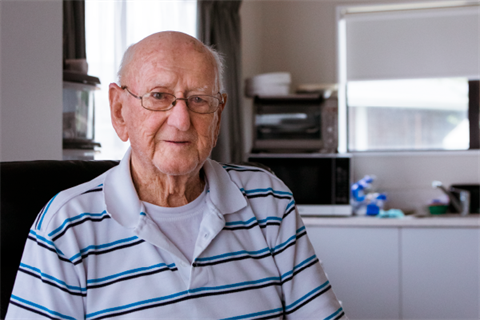John William ‘Bill’ Morton
Published on May 13, 2022

We spoke to Bill about his time in the military and what we uncovered from the 99-year-old was a rich and interesting life steeped in hard work, determination and bravery.
Bill Morton joined the Royal New Zealand Airforce, training at Weraroa (Levin) Flight School in 1939. This was where new recruits learned the basics of service life and became airmen and airwomen before moving onto more specific training.
He was sent to Fiji along with 1,200 New Zealand civilians, police officers and inspectors, to build the original airstrips at Nadi Airport, that remain the main hub for international flights into Fiji today.
During the construction of Nadi Airport, Japan entered World War II. Many of the workers on the Nadi airstrips marked their distaste for the actions of Japan by receiving tattoos. Bill adorned his arm with a dagger and scroll, symbolising ‘death before dishonour’.
Following the attack on Pearl Harbour in December 1941, New Zealand joined Britain and the United States of America in declaring war on Japan. As New Zealand troops prepared for battle, Bill, a member of St John and a volunteer for Wellington Free Ambulance, was drafted with the medical section and sent to Auckland Hospital where he trained in treating broken bones.
In 1942, at 18 years old, Bill was sent to the Solomon Islands with the Royal New Zealand Air Force (RNZAF) to support the United States in the Battle of Guadalcanal, where the Japanese had begun constructing an airfield. If this airbase became operational, the Japanese could attack the vital supply line between the United States, Australia and New Zealand.
The New Zealand squadron’s task was to clear the dense jungle and execute search and patrol missions, a welcomed support for the United States who eventually secured Guadalcanal.
During his time in service, Bill returned to New Zealand briefly as the liaison person between hospital staff and Airforce patients being treated in Wellington Hospital. He was also given the task of issuing cigars and cigarettes to war veterans.
Bill lost his mother during the war. He married upon his return to New Zealand and had two children. The challenges facing veterans returning home from World War II were similar to today’s returning veterans, but they were largely hidden: fears of unemployment, homelessness, post-traumatic stress disorder (PTSD) and difficulty getting benefits were on the minds of most.
Veterans were issued houses in Naenae and Taita, which were unfinished, the footpaths were rough and the homes had no power, but nevertheless it was a welcome reprieve and a foundation for Bill and his young family to build upon.
He now happily resides in Foxton, and will turn 100 years in May, coinciding with the 100 year anniversary of the ANZAC poppy.